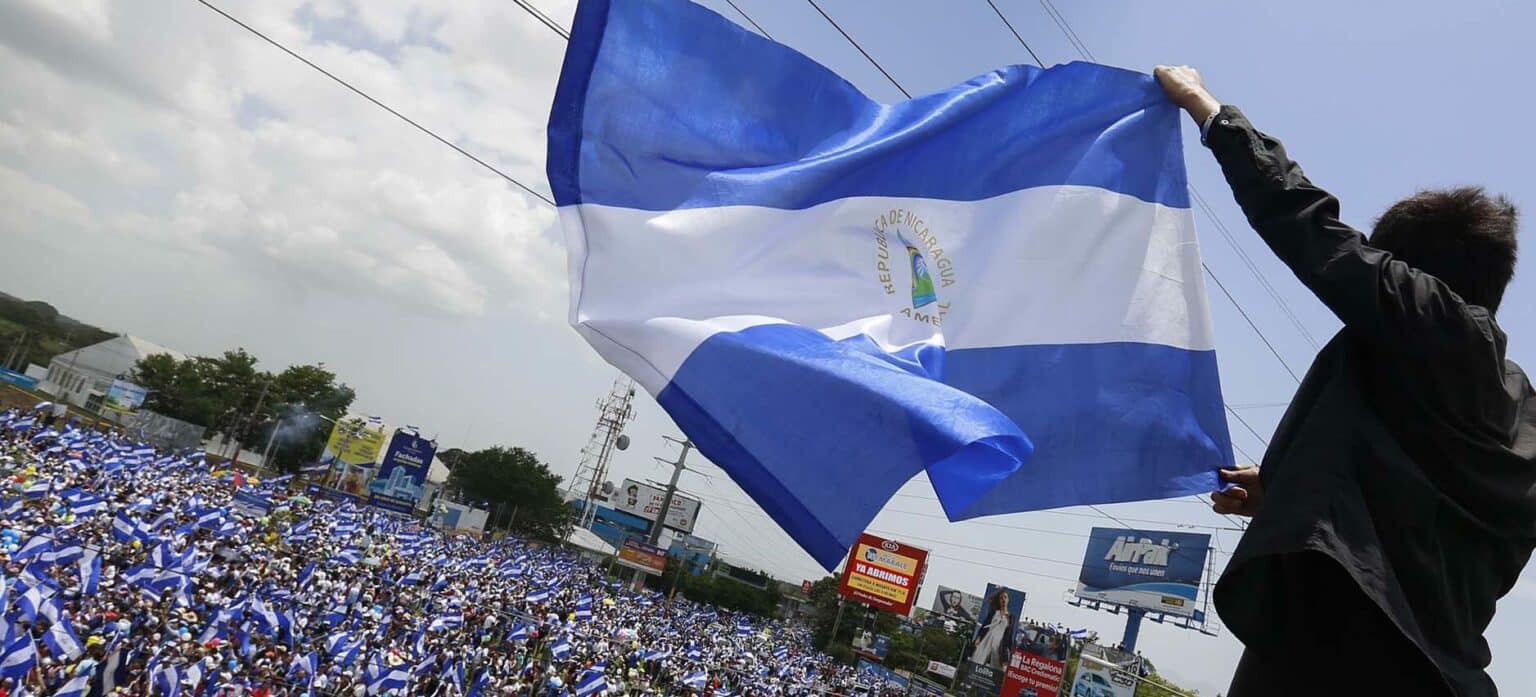Nicaragua has been removed from the grey list since October 2022 even though there are many proofs of dictatorship. When a country comes under the “grey list” of FATF, it immediately becomes hard for the country to get any loans from the organization, as its purpose of establishment was to develop policies to combat money laundering and to maintain certain interests. Its jurisdiction was broadened to encompass terrorism funding in 2001.
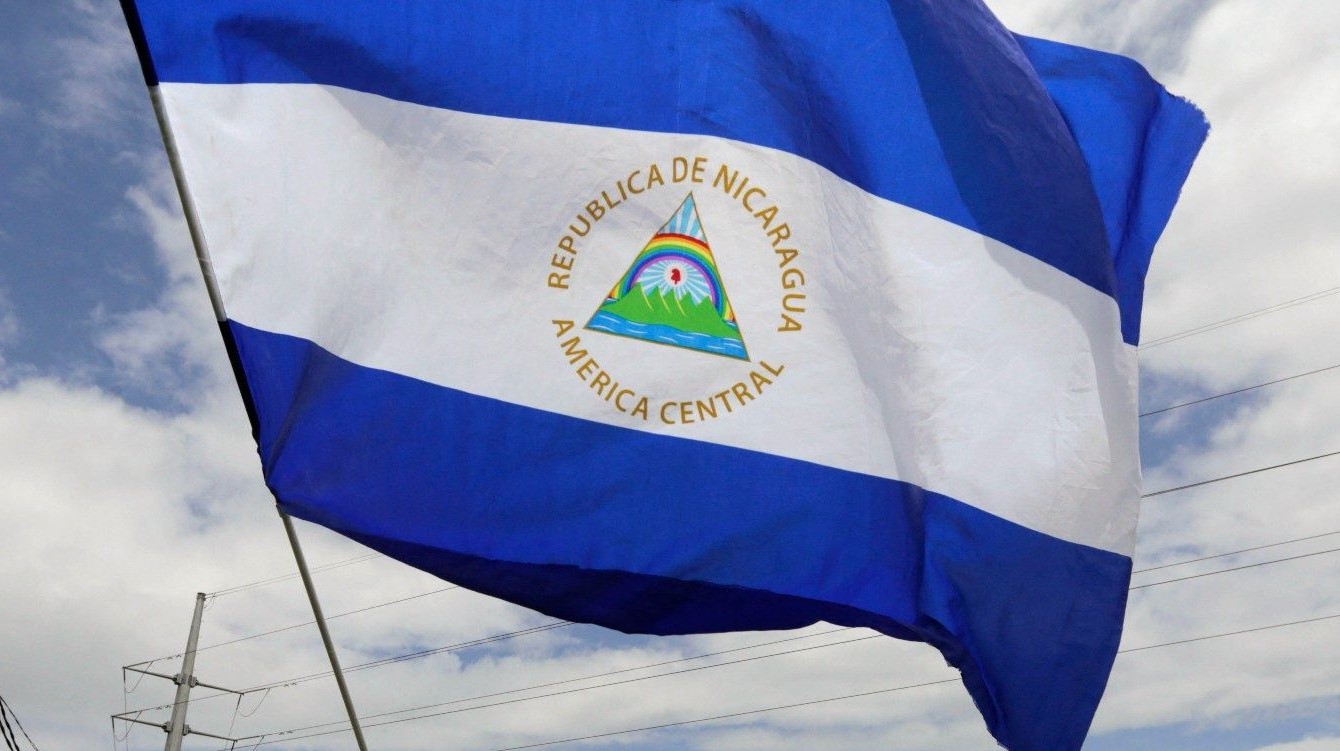
Nicaragua, located between the Pacific Ocean and the Caribbean Sea, is known for its dramatic terrain of lakes, volcanoes, and beaches. Nicaragua is under a lot of turmoil caused by its president, Daniel Ortega, who has been known to cause a lot of human rights violations with the help of his armed police forces. Last November, Nicaragua held its presidential election. Daniel Ortega was seeking a fourth consecutive term, and he made sure that nothing stood in his way, so he changed the country’s laws, silenced the media, and candidates who wanted to run against him were arrested.
History of Nicaragua
Nicaragua gained its freedom from its Spanish and British colonisers in the 1830s and was a part of the Mexican empire for a while. In the 1900s, Nicaragua was under the dictatorship of the Somoza family, a political family that ruled Nicaragua for forty-three years, from 1936 to 1979.
In 1979, the Nicaraguan government of President Anastasia Somoza fell to a popular uprising led by the Sandinistas, who installed a new government. Almost immediately, armed resistance to this new government arose. The US abandoned its initial support of the Sandinista government when it learned that Nicaragua was supplying aid to Marxist guerrillas in El Salvador. Thereafter, the US began covertly channelling money, weapons, and other support to the Nicaraguan opposition, known as the Contras. In 1983 and 1984, US military personnel mined Nicaraguan harbours and carried out attacks on Nicaraguan facilities. In 1984, Nicaragua filed suit against the US in the International Court of Justice, claiming that the US had violated both the UN Charter and principles of customary international law. Nicaragua asked that the US be ordered to cease its operations in the country and pay reparations.
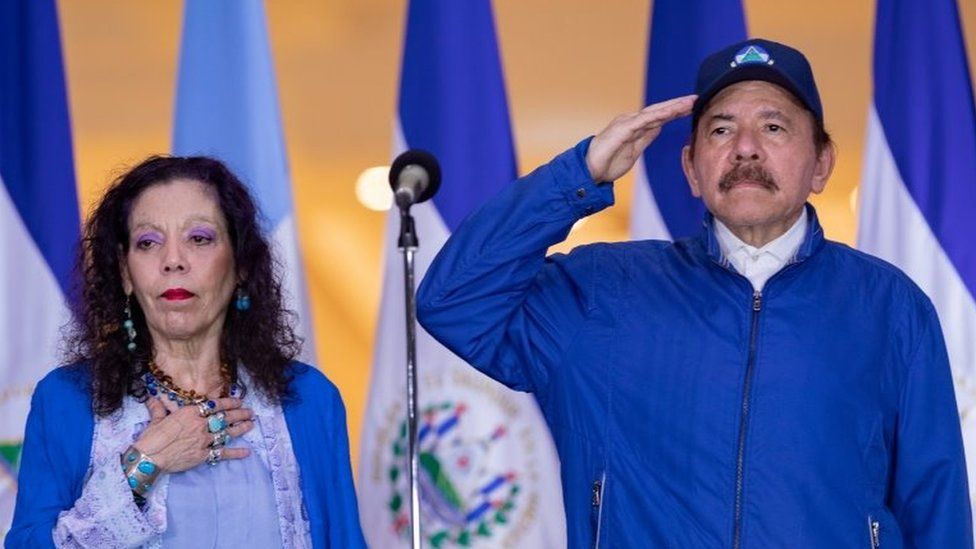
Ortega’s Sandinista guerrillas were credited with bringing down the Samosa family dictatorship in Nicaragua; later, they fought off the US-sponsored contras. In 1984, Daniel Ortega was elected president. But in the 1990 election, the Sandinista regime was no more, as Daniel Ortega was voted out. But he returned to power in 2006, promising to fight corruption, but instead, he went on to tighten his grip on the country. He first changed the constitution so that he could serve more terms, and then he made his wife, Rosario Mario, his vice president. Their children also hold key positions in Nicaragua; eight of the nine children were made presidential advisors. Their job is to oversee a lucrative oil distribution business and most of the country’s TV. Nicaragua is still the second poorest country in the western hemisphere, even though the family’s wealth has exploded.
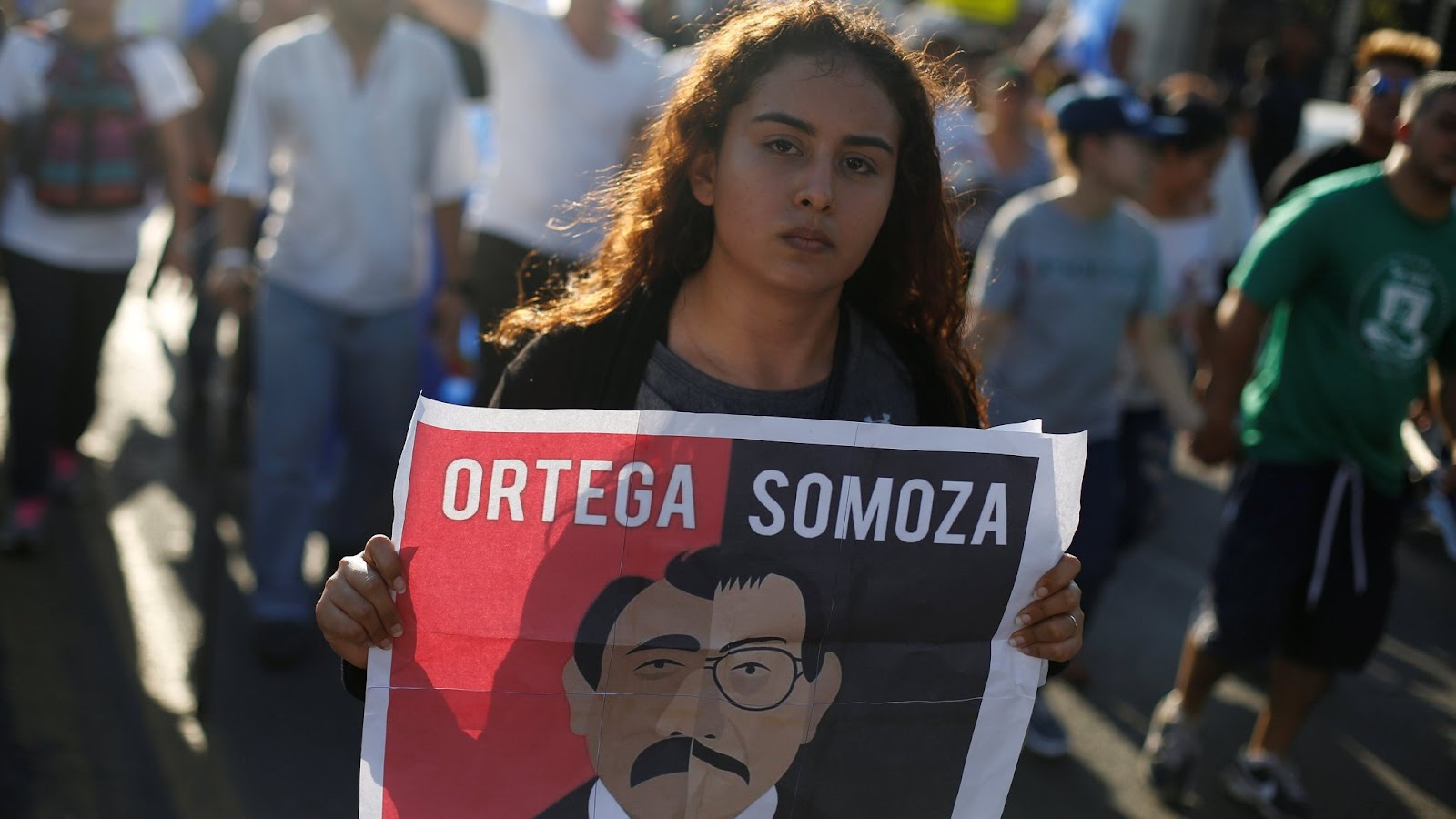
The Nicaraguan Revolt of 2018
In 2018, Nicaraguans revolted against Ortega’s regime. As thousands of people took to the streets to protest Ortega’s proposed cuts to social security for senior citizens, soon the protesters were calling for Ortega and his wife to step down. This was a turning point for the country as that demonstration was confronted with brutal force by Ortega, thousands of people were injured, more than 700 people were arrested, and at least 350 people were killed by the police or paramilitary groups who were supported by the Nicaraguan government. Ortega and his security forces were able to get away with committing all those crimes and atrocities. Nicaraguan journalists called it a massacre of protesters. Ortega also realised that if he lost his power, he might be imprisoned for what he did.
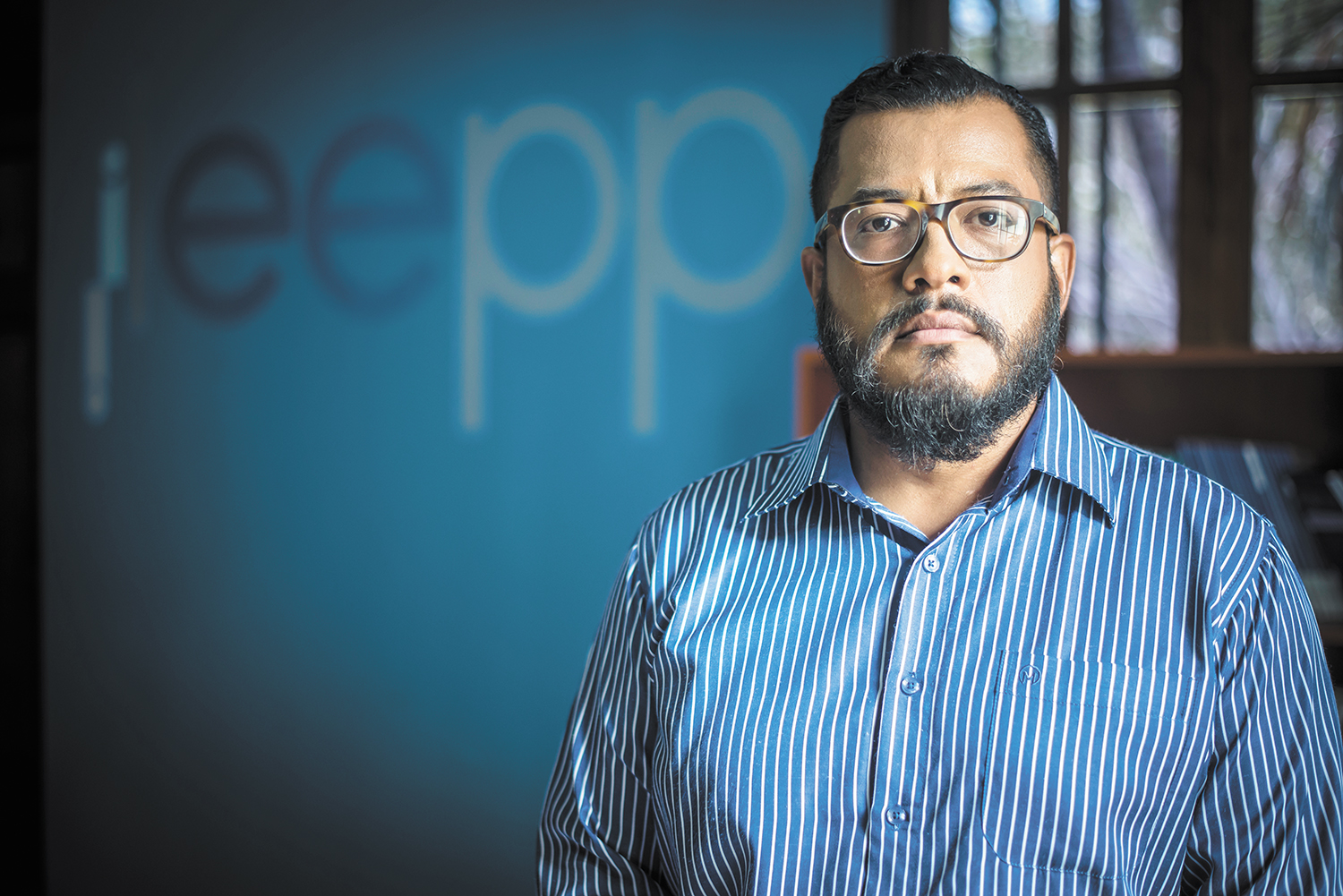
Felix Maradiaga, a Harvard graduate, was a former cabinet member and one of Ortega’s most outspoken critics. He addressed the world leaders at the 2019 Geneva summit on human rights and democracy, saying that he had come with the conviction and hope that the world would continue to support the struggle of his people to build a free and open society. Felix Maradiaga was teaching non-violent activism to Nicaraguan students when he was beaten by Ortega’s henchmen in 2018; according to a witness report, he was also hospitalized. For the next few years, he was constantly under surveillance by the police, according to his wife; from December 2020 to February 2021, he was put under house arrest. Felix and other people decided to run for president and band together to defeat Ortega; they even signed a document stating that they are willing to support the one who could represent the Nicaraguan people, but before they could officially put their candidate name forward, they either fled the country or were arrested.
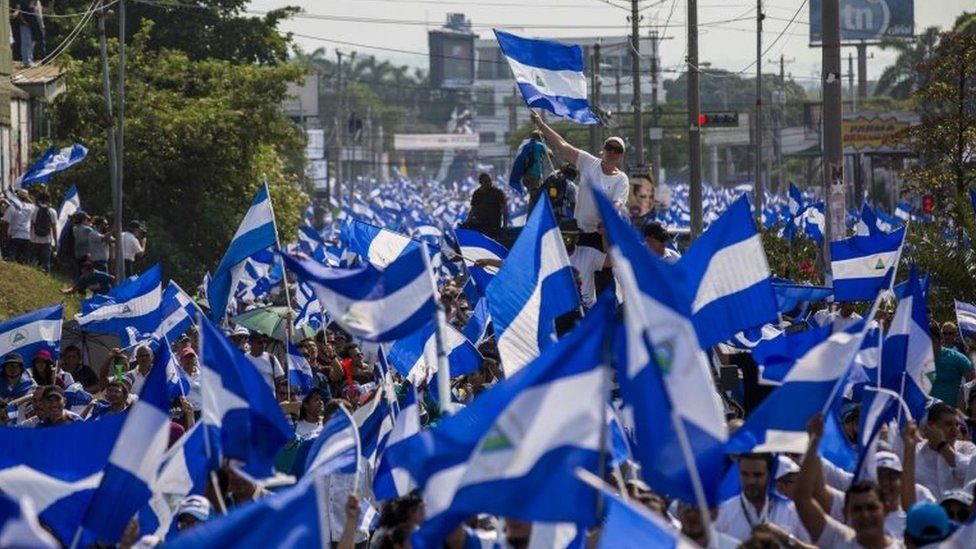
Nicaragua in 2021
The human rights issue in Nicaragua remained. The working environment for journalists, human rights advocates, and healthcare professionals remained harsh. Journalists, human rights advocates, and political activists were routinely arrested without cause. Indigenous peoples continue to be the target of violence. The COVID-19 epidemic was not accurately reported by the government.
Freedom of speech
One of the major groups promoting press freedom, the Violeta Barrios de Chamorro Foundation, was the target of a judicial probe by authorities in May on allegations of money laundering. The Foundation’s director, a candidate for president, was detained at the end of 2021 after being arrested in June.
In May, a raid took place on the offices of the television show Esta Semana and the website Confidential, forcing the director back into exile. Two journalists named Miguel Mora and Miguel Mendoza were detained in June and were still there at year’s end.
The Public Prosecutor’s Office has summoned for questioning more than 25 media employees who had worked with the Violeta Barrios de Chamorro Foundation as of August. Several journalists reported being threatened with criminal charges during interviews, including under the Special Law on Cybercrime.
In August, the newspaper La Prensa was searched, and its property was taken. The general manager was arrested on suspicion of money laundering. The NGO Reporters without Borders demanded his immediate release, but he remained imprisoned until the end of the year.
During the year, a number of journalists fled the nation due to the hostile climate and ongoing attacks by authorities.
Defenders of human rights
NGOs and human rights defenders were facing an extremely harsh environment. 45 NGOs’ legal registration was rescinded, and the NGOs whose registration was cancelled in 2018 were not reinstated, and the assets that were taken from them were not returned. They faced arbitrarily detention and were criminalized, and women human rights defenders were subjected to threats, police harassment, smear campaigns, and criminalization.
Arbitrary detention
It had become the norm for the people to raise their voices in protest of the government. They were treated very badly and were not allowed to see their families. Women detainees were sometimes with children and were subjected to violence. Even the relatives of the detainees were subjected to harassment; they were not allowed to travel abroad and faced criminal prosecution.
The Inter-American Court of Human Rights granted inmates interim measures and ordered their release. However, authorities did not follow the court’s judgments.
Authorities arbitrarily kidnapped, abducted, and punished political opponents and presidential candidates. The Inter-American Commission on Human Rights (IACHR) received reports of heightened police harassment, threats, and arbitrary detentions of opposition leaders, human rights activists, members of civil society groups, and journalists in the days leading up to and during the elections.
Forced Disappearances
It was found out that between May and November, 39 people who were considered opposition were detained by the authorities, including seven hopeful presidential candidates. The victims who were forced to disappear by the authorities were not seen for many months.
Rights of Indigenous Peoples of Nicaragua
There were many reports from different organisations about killing and displacing indigenous peoples all over the country. The indigenous people were subjected to killing, kidnapping, arson attacks, and sexual assault on their homeland.
Right to health
The conditions of the indigenous and Afro-descendent people regarding the COVID-19 infection were bad, as OHCHR saw a lack of disaggregated data on measures to protect them. The lack of official information in Nicaragua played a part in the Pan American Organization not being able to assess the state of the pandemic in the country.
The health workers received threats and harassment from the government for criticising the government for their policies and how they handled the pandemic. The vice president called the protesting doctors “fake doctors,” and for their own safety, some even fled the country.
Removal of Nicaragua from the FATF grey list
For the above-mentioned reasons Nicaragua was grey listed by FATF, but seeing it complied with most of the recommendations it had been revoked from the list. The FATF acknowledges Nicaragua’s improvements to the AML/CFT regime components addressed by its plan of action. In order to fulfil its obligations under its action plan on the strategic shortcomings in the categories that the FATF highlighted in February 2020, Nicaragua has corrected technical flaws. As a result, Nicaragua is no longer bound to the FATF’s stricter monitoring regime.
The FATF is extremely worried, nevertheless, about the possibility that the FATF Standards may be applied incorrectly and Nicaragua’s nonprofit sector could be crushed as a result. As part of its ongoing collaboration with GAFILAT, Nicaragua should ensure that it’s monitoring of non-profit organisations is risk-based and compliant with the FATF Guidelines. Nicaragua is highly urged to keep working alongside GAFILAT on this matter.
Many Nicaraguans fled the country in a large exodus to Costa Rica and the US. The US State Department announced more sanctions against members of the Ortega regime. Still, at the same time, the International Monetary Fund approved sending more than 350 million dollars to Nicaragua to help them fight hunger and COVID-19. In September, members of Congress from both parties demanded the IMF reconsider sending more money to Nicaragua, calling for stronger sanctions against Ortega. The Pentagon also warned Congress that Russia has been supplying Nicaragua with millions of dollars worth of military equipment and training. It has also been said that Ortega has allowed Russia to build a listening station so close to the USA. This all seems like deja vu, as almost the same kind of scenario happened during the Cold War. With Russia’s continued support, the USA’s will not be enough to change Ortega’s mind, of course.
Read More: https://tdznkwjt9mxt6p1p8657.cleaver.live/the-25-unspoken-convicts-of-the-fatf-sanction-list/
DO FOLLOW:







